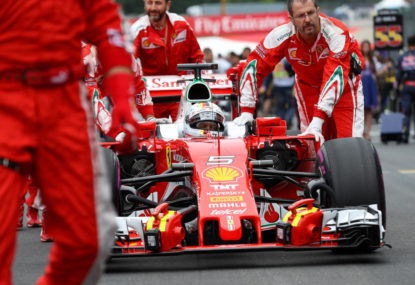'Welcome back': Reliving the last Chinese Grand Prix ahead of its much-anticipated return five years later
Five-years is a long time in motorsport, let alone the general state of the world – especially given the impact of the Covid-19 pandemic…

On the same day that the FIA announced the polarising ‘Halo’ would be introduced to Formula One from 2018, reports surfaced that the sport’s two leading manufacturers were unwilling to come to the aid of one of Formula One’s iconic outfits.
The British Grand Prix marked the fiftieth event since McLaren rekindled its formerly successful relationship with Honda in 2015, though the second iteration has lurched from one crisis to another, of which the issues have been thoroughly documented.
Reaching its nadir in the current campaign – with a lonely two points gleaned from ten starts, has culminated in the Woking outfit’s desire to cut its losses and pursue an alternative supplier. However, the former’s desperate, face saving attempts to extract itself from the arrangement have fallen on deaf ears, with Mercedes and Ferrari apparently, albeit understandably, declining to provide engines to the fallen giant from next season.
McLaren executive director, Zak Brown, suspects this season’s title protagonists “enjoy seeing us where we are today”, which speaks to the twisted nature of Formula One, that despite its current plight, the marques are wary of a resurgence if an agreement were reached, “a fear which is understandable”, the American remarked to Sky Sports.
On account of the acrimonious manner in which McLaren and Mercedes concluded its lengthy partnership in 2014, the latter’s resistance is logical, while the notion of Ferrari powering its traditional nemesis was always a long shot, yet the collective rejection highlights the lack of altruism in a deeply cynical sport.
Formula One’s history, particularly in the ruthless modern age, is littered with examples of selfishness at the detriment of competition, and not without sufficient reason. A case in point is Mercedes’ refusal to supply Red Bull following its spat with Renault in 2015 on similar grounds, coupled with the latter’s belligerence, though in certain instances, often ironic anecdotes.
Foremost being McLaren’s olive branch under Martin Whitmarsh’s directive to offer a batch of Mercedes engines to Brawn GP – the phoenix which rose from, wait for it… Honda’s ashes, ahead of the 2009 season. Brawn’s subsequent fairytale title and Ron Dennis’ desire for autonomy in the road car division convinced the German manufacturer to forge its own trajectory, precipitating events which drove McLaren into Honda’s arms.
In a business where hundreds of millions of dollars are at stake – certainly for manufacturers, it’s rich to assume they will act with competitors’ interests at heart, yet a once bitten, twice shy philosophy which operates on a cyclical basis, where today’s paupers will remember others’ deeds once their time in the sun arrives, dictates that benevolence doesn’t enter consideration.
So where does all of this leave McLaren? The solitary alternate active on the grid is Renault, which is increasingly committed to its factory operation, and remains heavily involved with Red Bull despite the aforementioned row, thus any collaboration exposes the French manufacturer to spreading its resources thinly.
This leads to the inexplicable conclusion that McLaren must grit its teeth and persevere with Honda, which Brown believes “can get the job done, they have in the past”, for what that’s worth. His most pragmatic statement, that “we can’t continue to be uncompetitive”, represents more of a futile dream than confidence that a brighter future lies on the horizon, as it stands, that’s all they have – hope.
It’s easy to become disillusioned with those who refuse to come to the table for the greater good, yet it’s part and parcel in a fickle environment which can turn on a dime, and only the fullness of time will determine the outcome fate bestows on a decision not given second thought in the present.